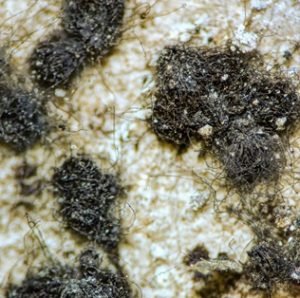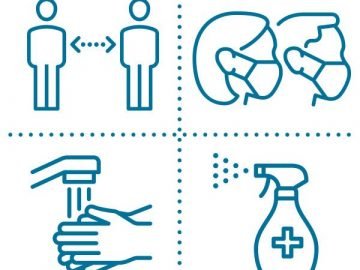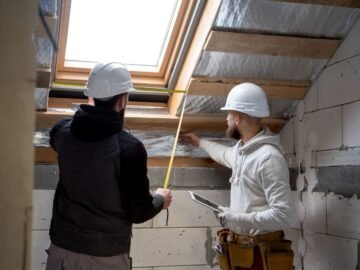Mold Remediation
Mold Growth is Common
Found mold growth in your home or property? It’s a common occurrence, no matter where you live. Mold is a natural part of the outdoors, and microscopic mold spores often make their way indoors. The only time mold becomes a problem is when it grows into a mold “colony,” which is what you’re seeing when you find “mold” in your home. Mold carries with it some pretty serious health concerns but affects everyone differently. What may really harm one person may literally not bother someone else at all.
So, should you be concerned? The answer is: it depends. If you find or suspect mold growth in your home or property, a great place to start is by contacting your insurance company to find out if you have coverage. From there you’ll be able to determine the next mold remediation steps you should take and the best course of action for your particular situation. In the meantime, read below for more information about mold in general, and best practices when it comes to practically dealing with mold colony growth.

Mold Grows Everywhere
Mold grows everywhere around the country and the world. People tend to associate humid climates with mold growth and assume that mold isn’t common in drier climates. While it’s true that mold growth is more common on building exteriors in humid parts of the country, it’s also true that lifestyle choices create much more humidity in our dwellings than we realize.
Consider the amount of humidity created while cooking on the stove or while boiling water. Think also about the amount of steam that comes off a hot shower. Couple this with the fact that modern homes are built much more air-tight than older homes, and that most people don’t often open their doors or windows for fresh air exchange. In reality, our homes – even in dry climates – are prime places for mold growth. All it takes for mold growth are a few simple ingredients.
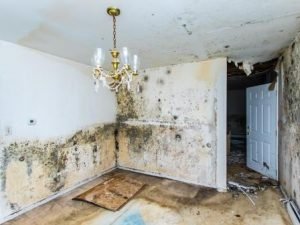
Mold Growth Conditions
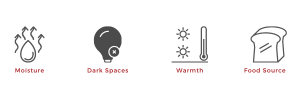
Mold only requires four things to grow: 1) moisture, 2) dark spaces, 3) warmth, and 4) a suitable food source. That’s it. Moisture, as mentioned above, is commonly found in numerous household places such as kitchens and bathrooms. Dark spaces can be found in cabinets, corners, and behind drywall. Most people naturally keep their homes sufficiently warm enough to support mold growth. And suitable food sources for mold colonies might also be more common than you think.
Mold can grow on any partially organic material such as drywall. In fact, you may even have seen microbial growth on hard surfaces at some point in your life. Mold colonies can form over ceramics (toilets, bathtubs) and even rocks, if there is sufficient “food” material on the surface that it can use as a base. Like any organic matter, mold is adaptive to its environment and finds unsuspected and unusual ways to thrive. It’s important to remember, however, that mold is just another part of our natural world. And furthermore, that its presence does not automatically mean your health, or the health of your family, is at risk.
Health Concerns
There are literally over 100,000 different species of mold. Some of which are common to homes, and many more that are only found out in nature. Of those most commonly found in homes, which are the most dangerous? Actually, there aren’t any specifically “dangerous” mold species to humans. The reality is that every person reacts drastically differently to mold species and quantities of mold spores in an environment.
Consider this: if you walk outside right now you immediately have a 100% likelihood of subjecting yourself to microscopic amounts of airborne mold spores. So, mold spores in and of themselves aren’t dangerous. The problem occurs when a person is subject to a type of mold to which they are personally susceptible, and in large enough quantities. Even the EPA (Environmental Protection Agency) does not have a certified level of mold spores in a home environment that is dangerous, or toxic.
What may be fine for one person (in terms of airborne mold spore count, and species) can be crippling for another. Mold exposure can cause headaches, shortness of breath, unexplainable fatigue, and overall body sickness. Symptoms can be very mild or can debilitate a person for life. Because the potential health concerns can be so devastating, mold should not be taken lightly.
Insurance and Mold Remediation
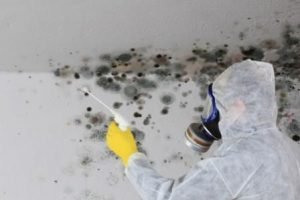
If you have any concerns about mold in your home at all, the best way to begin is to contact your insurance company. If you aren’t incredibly familiar with your insurance policy, your insurance carrier or agent can tell you if mold is covered under your policy. Most often, it is not. Mold is typically considered a “maintenance” issue in a home, as it takes some degree of time to grow. Insurance most often only triggers a payable claim if the loss is “sudden and accidental.” Mold may be accidental, but since it’s not sudden (like a burst water pipe in a home, or a fire), it typically falls under the “homeowner neglect” category.
Whether you have insurance coverage or not, however, if you suspect mold, it’s worth the money to protect your health. Your next step should be to contact an indoor environmental hygienist. Companies such as these offer air quality tests. These tests allow the hygienist to determine if there are mold spores present, in what quantity, and in what type. Furthermore, if you should hire a mold remediation company, the hygienist’s report is invaluable to them in determining mold removal protocol.
Brought to You by OutFactors
This information is provided by OutFactors, a home cash buyer. At OutFactors, we buy houses as-is for cash and close quickly. To get a cash offer on your home just enter your address and answer a few simple questions about the house. The entire process only takes about 2 minutes and personal information is NOT required. Yes, that is correct! No email address, no telephone number, not even your name. If you like the offer, great, your home is sold. If not, just “X” out and go enjoy the rest of your day. To get a great cash offer click here!
For those who prefer a personal touch, we invite you to call us at 800-420-7030 to speak with our friendly and helpful customer advocates. We are here to help!
OutFactors
539 West Commerce Street
Suite 1205
Dallas, Texas 75208
Contact@OutFactors.com
(800) 420-7030

